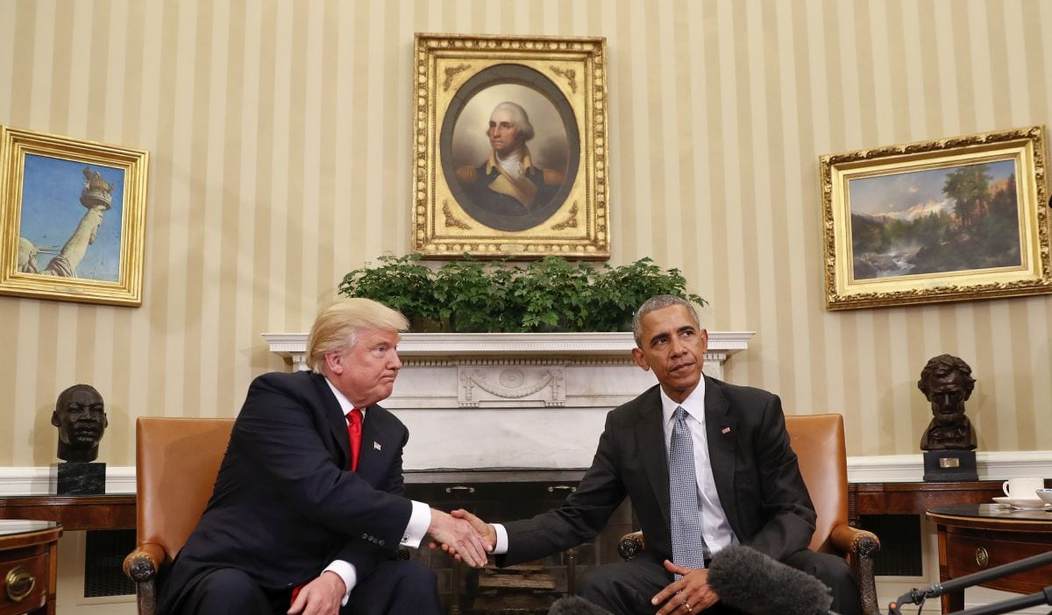Nothing gets under my skin more than so-called academics rewriting Obama’s legacy into something it wasn’t. As much as even the most learned historian can have partisan biases, you expect at least some attempt at objectivity. In an article called “How America went from Barack Obama to Donald Trump in one head-spinning political decade” written for USA Today, Princeton University historians Kevin M. Kruse and Julian E. Zelizer proved once again just how desperate academia is to put objectivity aside in favor of an Orwellian rewriting of history. While technically the article is an opinion piece, it is full of falsehoods and misrepresentations that you’d think would be beneath anyone who fancies themself a historian.
I had high hopes when I started reading it. “How did we get from Barack Obama to Donald Trump?” they ask right off the bat. “The two presidents seem so dissimilar that it’s tempting to conclude they come from separate worlds. But in important ways, Obama set the stage for Trump.”
It was all downhill from there. While they acknowledge that Obama and Trump have “incredibly different approaches to the presidency,” they completely misrepresented Obama’s governing style in a way that makes you wonder if they were even paying attention from January 2009 to January 2017.
“Throughout his two terms, Obama governed with a deep respect for government institutions and overall stability,” Kruse and Zelizer wrote. “Although he came into office with a strong mandate from the 2008 election, his political temperament led him to seek out compromise positions with Republicans from the outset.”
Either the multiverse is real, and they’re talking about a completely different dimension, or these two historians deliberately lied through their teeth. I’m going with the latter. To say Obama had respect for government institutions and overall stability is to completely ignore the rampant abuses of power and obstruction that stained his presidency. To suggest that Obama sought compromise with Republicans “from the outset” sounds more like a bad joke than an honest assessment of what actually happened. Remember Obamacare? That was supposed to be a bipartisan, transparent process, and it was anything but that. After having two years with Democrat majorities in the House and Senate, Obama was so utterly incapable of dealmaking that he didn’t even try.
“We are not just going to be waiting for legislation in order to make sure that we’re providing Americans the kind of help that they need,” Obama told the media in January 2014, right after Republicans took back control of the Senate. “I’ve got a pen, and I’ve got a phone,” he continued. Does that sound like someone who wants to work on compromise legislation with Congress or someone who wants his way or the highway?
Kruse and Zelizer seem to have forgotten all about that: “Obama’s legislative agenda was likewise crafted with an eye to bipartisanship.” Surely, they can’t be serious. Oh, but they are. Their evidence? Obama’s stimulus, and Obamacare! Do these Princeton historians need to be reminded about how Congress voted on these two pieces of legislation? The stimulus passed with zero Republican votes in the House, and only three in the U.S. Senate. One Republican vote came from Arlen Specter, who later switched to the Democratic Party, and the other two came from Susan Collins and Olympia Snowe, both moderates. As for Obamacare, it only got one Republican vote in the House, and zero in the Senate.
You would think that historians would know these are not great examples of bipartisan compromise legislation. They also regurgitated the false claim that Obamacare was modeled off of RomneyCare in Massachusetts.
According to Kruse and Zelizer, Obama “extended olive branch after olive branch to the GOP” and the GOP simply responded with “full-throated resistance.” Again, a total fabrication. Republicans wanted to be involved in crafting healthcare legislation that became Obamacare, but were kept out of the process in order for Democrat to get a bill written in secret and passed quickly.
Later, when Obama couldn’t count on a rubber-stamp Congress, he simply pretended Congress didn’t exist. He unilaterally committed U.S. troops to Libya and Syria, normalized relations with Cuba, signed the Paris Climate Treaty without Senate ratification, signed the Iran Nuclear Deal without Senate ratification, and effectively bypassed Congress by implementing more costly regulations via executive fiat than any president in history.
Yet, when it came to another example of Obama’s lack of bipartisan dealmaking skills, they managed to spin it in a whole different direction. “Obama launched the Dreamer program and sought a deal to create a path to citizenship for millions of undocumented immigrants.” Actually, Obama created the DACA program via executive action because the DREAM Act wouldn’t pass Congress. But, hey, they’re the historians, right?
Of course, just as these so-called historians have a distorted view of the Obama years, their assessment of Trump similarly lacks the objectivity you’d want in anyone claiming to be a historian. While Obama welcomed immigrants with open arms with his (unconstitutional) DACA program, Trump, they claimed, chose the opposite direction of “banning immigrants from Muslim countries to building a wall on the Mexican border.”
Kruse and Zelizer, being historians and all, should not be forgiven for forgetting that Obama actually did restrict refugees from the exact same countries Trump listed. Or that before Trump, top Democrats, including Barack Obama, supported a border wall.
Historians? Or partisan storytellers?
It saddens me that anyone claiming to be a historian could be so ignorant and/or fictitious in their assessment of recent history. I wouldn’t doubt that Kruse and Zelizer also believe the absurdity that Obama had a scandal-free administration.
_____
Matt Margolis is the author of Trumping Obama: How President Trump Saved Us From Barack Obama’s Legacy and the bestselling book The Worst President in History: The Legacy of Barack Obama. You can follow Matt on Twitter @MattMargolis










Join the conversation as a VIP Member